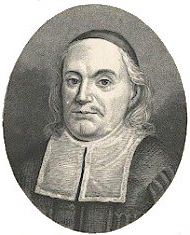Paul Gerhardt
| Paul Gerhardt | |
|---|---|
 |
|
| Born |
12 March 1607 Gräfenhainichen, Saxony-Anhalt |
| Died | 27 May 1676 (aged 69) Lübben, Saxe-Merseburg |
| Occupation |
|
Paul Gerhardt (12 March 1607 – 27 May 1676) was a German theologian, Lutheran minister and hymnodist.
Gerhardt was born into a middle-class family at Gräfenhainichen, a small town between Halle and Wittenberg. At the age of fifteen, he entered the Fürstenschule in Grimma. The school was known for its pious atmosphere and stern discipline. The school almost closed in 1626 when the plague came to Grimma, but Paul remained and graduated from there in 1627. In January 1628 he enrolled in the University of Wittenberg. There, two teachers in particular had an influence on him: Paul Röber and Jacob Martini. Both of these men were staunch Lutherans, promoting its teachings not only in the classroom but in sermons and hymns. Röber in particular often took his sermon texts from hymns. In this way Gerhardt was taught the use of hymnody as a tool of pastoral care and instruction.
Gerhardt graduated from the University of Wittenberg around 1642. Due to the troubles of the Thirty Years War it seems he was not immediately placed as a pastor, and thus moved to Berlin where he worked as tutor in the family of an advocate named Andreas Barthold. During his time in Berlin his hymns and poems brought him to the attention of Johann Crüger the cantor and organist at the Nicolaikirche in Berlin. Crüger was impressed by Gerhardt's hymns and included many of them in his Praxis pietatis melica. The hymns proved popular, and Gerhardt and Crüger began a collaboration and friendship that continued for many years.
In September 1651, Gerhardt received his first ecclesiastical appointment as the new Probst at Mittenwalde (a small town near Berlin) in 1651. It was during his time in Mittenwalde when he composed most of his hymns. Also while there he married Anna Maria Barthold, one of the daughters of Andreas Barthold. Their first child was born there in 1656, but died in infancy; a memorial tablet in the church shows their grief.
While Gerhardt was a devoted pastor in Mittenwalde it appears he missed Berlin. In 1657 he was called to be a Deacon (Associate Pastor) to the Nikolaikirche of Berlin. He seems to have had some hesitancy about leaving Mittenwalde since it was only after long deliberation he accepted the appointment.
...
Wikipedia
